
Christianity is an Abrahamic monotheistic religion, professing that Jesus was raised from the dead and is the Son of God, whose coming as the Messiah (Christ) was prophesied in the Hebrew Bible and chronicled in the New Testament. It is the world's largest and most widespread religion with over 2.38 billion followers, comprising around 31.2% of the world population. Its adherents, known as Christians, are estimated to make up a majority of the population in 157 countries and territories.

Iqaluit is the capital of the Canadian territory of Nunavut. It is the territory's largest community and its only city, and the northernmost city in Canada. It was known as Frobisher Bay from 1942 to 1987, after the large bay on the coast on which the city is situated. Its traditional Inuktitut name was restored in 1987.

Baffin Island, in the Canadian territory of Nunavut, is the largest island in Canada, the second-largest island in the Americas, and the fifth-largest island in the world. Its area is 507,451 km2 (195,928 sq mi) with a population density of 0.03/km2; the population was 13,039 according to the 2021 Canadian census; and it is located at 68°N70°W. It also contains the city of Iqaluit, which is the capital of Nunavut.
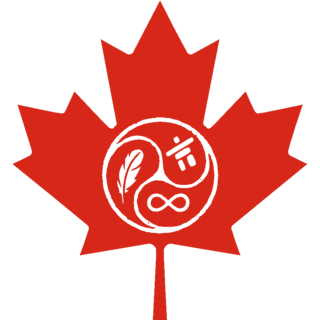
Inuit religion is the shared spiritual beliefs and practices of the Inuit, an indigenous people from Alaska, northern Canada, parts of Siberia, and Greenland. Their religion shares many similarities with some Alaska Native religions. Traditional Inuit religious practices include animism and shamanism, in which spiritual healers mediate with spirits. Today many Inuit follow Christianity ; however, traditional Inuit spirituality continues as part of a living, oral tradition and part of contemporary Inuit society. Inuit who balance indigenous and Christian theology practice religious syncretism.
Restorationism, also known as Restitutionism or Christian primitivism, is a religious perspective according to which the early beliefs and practices of the followers of Jesus were either lost or adulterated after his death and required a "restoration". It is a view that often "seeks to correct faults or deficiencies, in other branches of Christianity, by appealing to the primitive church as normative model".
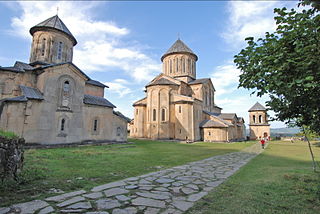
Gelati is a medieval monastic complex near Kutaisi in the Imereti region of western Georgia. One of the first monasteries in Georgia, it was founded in 1106 by King David IV of Georgia as a monastic and educational center.
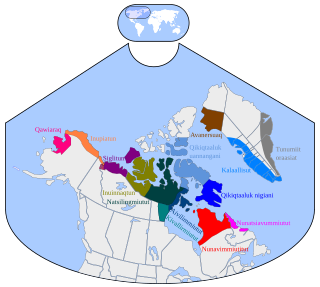
Inuktitut, also known as Eastern Canadian Inuktitut, is one of the principal Inuit languages of Canada. It is spoken in all areas north of the North American tree line, including parts of the provinces of Newfoundland and Labrador, Quebec, to some extent in northeastern Manitoba as well as the Northwest Territories and Nunavut. It is one of the aboriginal languages written with Canadian Aboriginal syllabics.

The Tausūg, are an ethnic group of the Philippines and Malaysia. A small population can also be found in the northern part of North Kalimantan, Indonesia. The Tausūg are part of the wider political identity of Muslim Filipinos of western Mindanao, the Sulu archipelago, and southern Palawan, collectively referred to as the Moro people. The Tausugs originally had an independent state known as the Sultanate of Sulu, which once exercised sovereignty over the present day provinces of Basilan, Palawan, Sulu, Tawi-Tawi, Zamboanga City, eastern part of Sabah and northeastern part of North Kalimantan. They are also known in the Malay language as Suluk.
Peter Freuchen K. Ittinuar is a Canadian politician. He was the first Inuk in Canada to be elected as an MP, and represented the electoral district of Nunatsiaq in the House of Commons of Canada from 1979 to 1984.
Thomas Suluk is a former Canadian politician. He represented the electoral district of Nunatsiaq in the House of Commons of Canada from 1984 to 1988 as a member of the Progressive Conservatives.
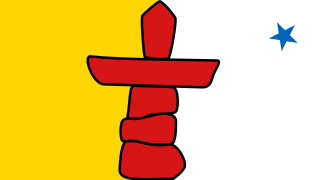
Nunavut is the largest and northernmost territory of Canada. It was separated officially from the Northwest Territories on April 1, 1999, via the Nunavut Act and the Nunavut Land Claims Agreement Act, which provided this territory to the Inuit for self-government. The boundaries had been drawn in 1993. The creation of Nunavut resulted in the first major change to Canada's political map in half a century since the province of Newfoundland was admitted in 1949.

The Türgesh or Türgish were a Turkic tribal confederation. Once belonging to the Duolu wing of the Western Turkic On Oq elites, Türgeshes emerged as an independent power after the demise of the Western Turks and established a khaganate in 699. The Türgesh Khaganate lasted until 766 when the Karluks defeated them. Türgesh and Göktürks were related through marriage.

Inuit are a group of culturally and historically similar Indigenous peoples traditionally inhabiting the Arctic and Subarctic regions of North America, including Greenland, Labrador, Quebec, Nunavut, the Northwest Territories, Yukon (traditionally), Alaska, and Chukotsky District of Chukotka Autonomous Okrug, Russia. Inuit languages are part of the Eskimo–Aleut languages, also known as Inuit-Yupik-Unangan, and also as Eskaleut. Inuit Sign Language is a critically endangered language isolate used in Nunavut.
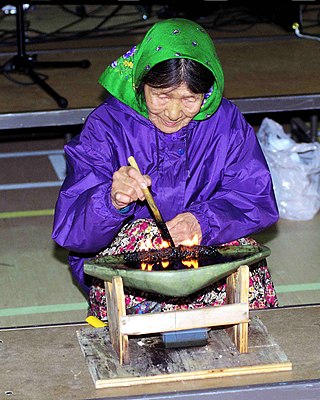
The Inuit are an indigenous people of the Arctic and subarctic regions of North America. The ancestors of the present-day Inuit are culturally related to Iñupiat, and Yupik, and the Aleut who live in the Aleutian Islands of Siberia and Alaska. The term culture of the Inuit, therefore, refers primarily to these areas; however, parallels to other Eskimo groups can also be drawn.
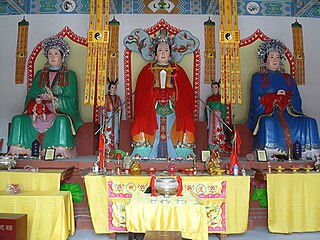
Folk religion, traditional religion, or vernacular religion comprises, according to religious studies and folkloristics, various forms and expressions of religion that are distinct from the official doctrines and practices of organized religion. The precise definition of folk religion varies among scholars. Sometimes also termed popular belief, it consists of ethnic or regional religious customs under the umbrella of a religion; but outside official doctrine and practices.
Umik was an Inuk angakkuq (shaman) who proclaimed himself a Christian evangelist and began to preach to the Igloolik Inuit in the 1920s.
Victor Tungilik was an Inuk religious figure who was both a Christian and a traditional angakkuq of Anglican parents. Tungilik later eschewed his angakkuq practices and moved to Naujaat.
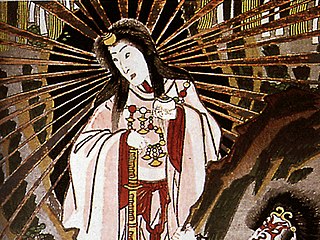
An akuma (悪魔) is an evil spirit in Japanese folklore, sometimes described in English-language sources as a devil or demon. An alternative name for the akuma is ma (ま). Akuma is the name assigned to Satan in Japanese Christianity, and the Mara in Japanese Buddhism.
Whaling in Canada encompasses both aboriginal and commercial whaling, and has existed on all three Canadian oceans, Atlantic, Pacific, and Arctic. The indigenous peoples of the Pacific Northwest Coast have whaling traditions dating back millennia, and the hunting of cetaceans continues by Inuit. By the late 20th century, watching whales was a more profitable enterprise than hunting them.











